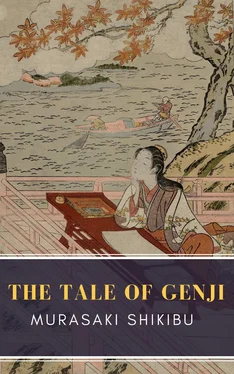“And so, despite this strange state of affairs, I was convinced that she did not mean to do without me. I continued to send messages, and she neither protested nor gave an impression of wanting to annoy me by staying out of sight, and in her answers she was always careful not to anger or hurt me. Yet she went on saying that she could not forgive the behavior I had been guilty of in the past. If I would settle down she would be very happy to keep company with me. Sure that we would not part, I thought I would give her another lesson or two. I told her I had no intention of reforming, and made a great show of independence. She was sad, I gathered, and then without warning she died. And the game I had been playing to seem rather inappropriate.
“She was a woman of such accomplishments that I could leave everything to her. I continue to regret what I had done. I could discuss trivial things with her and important things. For her skills in dyeing she might have been compared to Princess Tatsuta and the comparison would not have seemed ridiculous, and in sewing she could have held her own with princess Tanabata.”
The young man sighed and sighed again.
Tō no Chūjō nodded. “Leaving her accomplishments as a seamstress aside, I should imagine you were looking for someone as faithful as Princess Tanabata. And if she could embroider like princess Tatsuta, well, it does not seem likely that you will come on her equal again. When the colors of a robe do not match the seasons, the flowers of spring and the autumn tints, when they are somehow vague and muddy, then the whole effort is as futile as the dew. So it is with women. It is not easy in this world to find a perfect wife. We are all pursuing the ideal and failing to find it.”
The guards officer talked on. “There was another one. I was seeing her at about the same time. She was more amiable than the one I have just described to you. Everything about her told of refinement. Her poems, her handwriting when she dashed off a letter, the koto she plucked a note on — everything seemed right. She was clever with her hands and clever with words. And her looks were adequate. The jealous woman’s house had come to seem the place I could really call mine, and I went in secret to the other woman from time to time and became very fond of her. The jealous one died, I wondered what to do next. I was sad, of course, but a man cannot go on being sad forever. I visited the other more often. But there was something a little too aggressive, a little too sensuous about her. As I came to know her well and to think her a not very dependable sort, I called less often. And I learned that I was not her only secret visitor.
“One bright moonlit autumn night I chanced to leave court with a friend. He got in with me as I started for my father’s. He was much concerned, he said, about a house where he was sure someone would be waiting. It happened to be on my way.
“Through gaps in a neglected wall I could see the moon shining on a pond. It seemed a pity not to linger a moment at a spot where the moon seemed so much at home, and so I climbed out after my friend. It would appear that this was not his first visit. He proceeded briskly to the veranda and took a seat near the gate and looked up at the moon for a time. The chrysanthemums were at their best, very slightly touched by the frost, and the red leaves were beautiful in the autumn wind. He took out a flute and played a tune on it, and sang’The Well of Asuka’ and several other songs. Blending nicely with the flute came the mellow tones of a japanese koto. It had been tuned in advance, apparently, and was waiting. The ritsu scale had a pleasant modern sound to it, right for a soft, womanly touch from behind blinds, and right for the clear moonlight too. I can assure you that the effect was not at all unpleasant.
“Delighted, my friend went up to the blinds.
“‘I see that no one has yet broken a path through your fallen leaves,’ he said, somewhat sarcastically. He broke off a chrysanthemum and pushed it under the blinds.
“‘Uncommonly fine this house, for moon, for koto.
Does it bring to itself indifferent callers as well?
“‘Excuse me for asking. You must not be parsimonious with your music. You have a by no means indifferent listener.’
“He was very playful indeed. The woman’s voice, when she offered a verse of her own, was suggestive and equally playful.
“‘No match the leaves for the angry winter winds.
Am I to detain the flute that joins those winds?’
“Naturally unaware of resentment so near at hand, she changed to a Chinese koto in an elegant banjiki . Though I had to admit that she had talent, I was very annoyed. It is amusing enough, if you let things go no further, to exchange jokes from time to time with fickle and frivolous ladies; but as a place to take seriously, even for an occasional visit, matters here seemed to have gone too far. I made the events of that evening my excuse for leaving her.
“I see, as I look back on the two affairs, that young though I was the second of the two women did not seem the kind to put my trust in. I have no doubt that the wariness will grow as the years go by. The dear, uncertain ones — the dew that will fall when the hagi branch is bent, the speck of frost that will melt when it is lifted from the bamboo leaf — no doubt they can be interesting for a time. You have seven years to go before you are my age,” he said to Genji. “Just wait and you will understand. perhaps you can take the advice of a person of no importance, and avoid the uncertain ones. They stumble sooner or later, and do a man’s name no good when they do.”
Tō no Chūjō nodded,as always. Genji, though he only smiled, seemed to agree.
“Neither of the tales you have given us has been a very happy one,” he said.
“Let me tell you a story about a foolish woman I once knew,” said Tō no Chūjō.” I was seeing her in secret, and I did not think that the affair was likely to last very long. But she was very beautiful, and as time passed I came to think that I must go on seeing her, if only infrequently. I sensed that she had come to depend on me. I expected signs of jealousy. There were none. She did not seem to feel the resentment a man expects from a woman he visits so seldom. She waited quietly, morning and night. My affection grew, and I let it be known that she did indeed have a man she could depend on. There was something very appealing about her (she was an orphan), letting me know that I was all she had.
“She seemed content. Untroubled, I stayed away for rather a long time. Then — I heard of it only later — my wife found a roundabout way to be objectionable. I did not know that I had become a cause of pain. I had desperately lonely and worried for the child she had borne. One day she sent me a letter attached to a wild carnation.” His voice trembled.
“And what did it say?” Genji urged him on.
“Nothing very remarkable. I do remember her poem, though:
“‘The fence of the mountain rustic may fall to the ground.
Rest gently, O dew, upon the wild carnation.’
“I went to see her again. The talk was open and easy, as always, but she seemed pensive as she looked out at the dewy garden from the neglected house. She seemed to be weeping, joining her laments to the songs of the autumn insects. It could have been a scene from an old romance. I whispered a verse:
“‘No bloom in this wild array would I wish to slight.
But dearest of all to me is the wild carnation.’
“Her carnation had been the child. I made it clear that my own was the lady herself, the wild carnation no dust falls upon.
“She answered:
“‘Dew wets the sleeve that brushes the wild carnation.
The tempest rages. Now comes autumn too.’
Читать дальше












